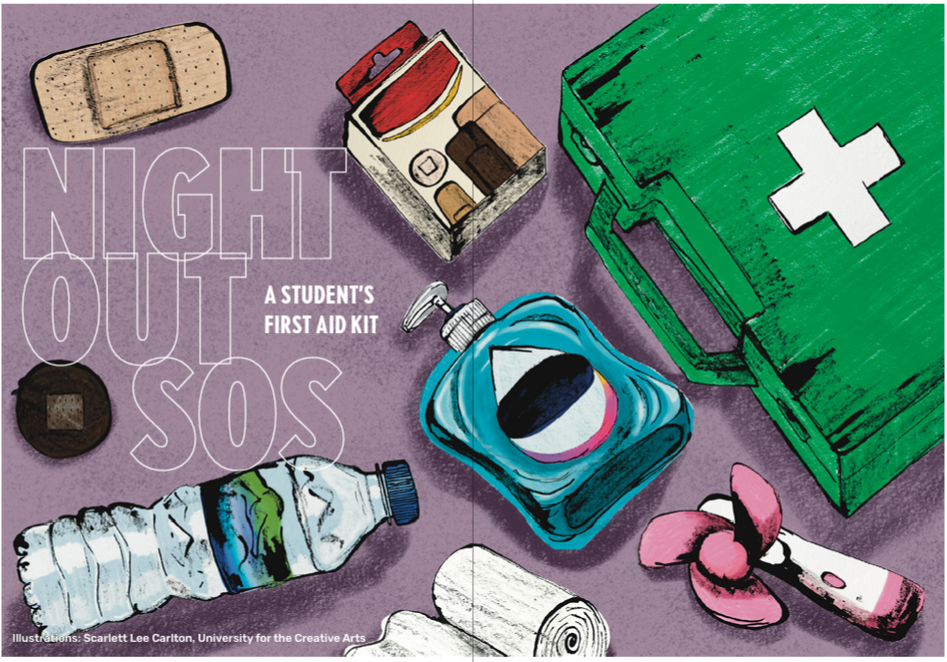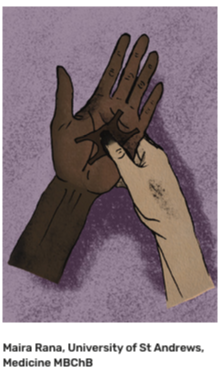Written by Maira Rana, University of St Andrews, September 2023
Have some basic first aid knowledge under your belt for a night out. It’s worth it.
As summer fades, we’re all scrambling to organise ourselves before heading to university, whatever year we’re in. You may have already planned exactly which bars and clubs to visit after settling in – if so, nice work – but there’s something else important, too: having some basic first aid knowledge under your belt for a night out. It’s worth it. So: from a med student, here’s what to do if…
A friend cuts or grazes their hand
It’s easily done. Thankfully, it’s easily treated, too. First, stop the bleeding by applying pressure with something clean, dry and absorbent. A bandage or nonfluffy towel should do it. Next, wash your hands thoroughly and pat them dry before cleaning the wound using sterile wipes, bottled water or, if you can get it, cooled boiled water. After that, clean the skin around the wound using soap and water, then pat the area dry with a clean tea towel and stick a plaster on it. The wound, not the tea towel.
A friend slips or trips and falls
You’re in a busy place, a few drinks in, and the lighting’s low: falling over is a strong possibility. If it happens to someone you know, take a minute or so to help them check for injuries. Ask if they’re OK and confirm they can understand their surroundings. Then help them to get up, by gently instructing them to roll safely onto their hands and knees before using a stable piece of furniture to hold onto, with both hands, in order to support themselves. However, if you find that your friend suddenly becomes confused after falling and shows symptoms such as feeling disoriented, struggling to pay attention, or not being able to think or speak clearly and quickly – or even hallucinating – then try to ask them a couple of questions: their name, their age, and today’s date. If they seem unsure or can’t answer, they’ll most likely need medical help, because many causes of sudden confusion, including head injury, need to be assessed and treated as soon as possible. While you wait, stay with your friend, tell them who you are and where you are, and keep reassuring them. Make sure you use simple words and avoid continually asking them lots of questions.
A friend is experiencing dehydration or heat exhaustion
Alcohol + dancing + packed nightclub crowds = dehydration (naturally) and potentially heat exhaustion (wait, really?). Yes, even in the UK. Some symptoms of heat exhaustion: headaches; excessive sweating; clammy and pale skin; leg, arm and stomach cramps; fast breathing; a high temperature; extreme thirst and weakness. Fortunately, heat exhaustion doesn’t require emergency medical assistance if you can help your friend to cool down within half an hour and prevent them from developing heatstroke. Move them to a cool place, help them to remove excess clothing, such as jackets or socks, and give them a cool sports drink, rehydration drink, or water. You can also cool them down further by fanning them and either sponging or spraying them with cold water. Best ask first.
 A friend has drunk too much alcohol
A friend has drunk too much alcohol
Resist the temptation to draw on them, and first check for symptoms of alcohol poisoning, which can range from slurring, being sick and having pale or blue tinged skin, to slow or irregular breathing, suffering a fit or passing out. Stay with your friend. If they’ve lost consciousness, put them in the recovery position and check they’re breathing properly; if they’re awake, help them to sit up. Keep them warm with a jacket and provide water to sip, not glug, but don’t give them caffeine or more alcohol, because it can lead to further dehydration. The NHS also advises going to the hospital to be monitored, as alcohol poisoning can have serious complications.
A friend has been spiked
It’s so important to recognise the signs of spiking. They can include dizziness, difficulty walking, hallucinations, visual problems, paranoia and amnesia. It’s also vital to alert security staff so they can help you to arrange the appropriate medical care, such as going to A&E or visiting a walk-in centre, depending on your friend’s health. But don’t leave your friend alone while doing this. And keep talking to them, to ensure they stay awake.
